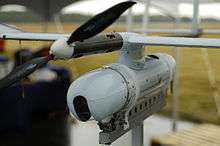Elbit Skylark
| Elbit Skylark | |
|---|---|
 | |
| Skylark 1 | |
| Role | Miniature UAV |
| National origin | Israel |
| Manufacturer | Elbit Systems |
| Primary user | Israel Defense Forces |


The Elbit Systems Skylark I and Skylark II are small Miniature UAVs developed by Elbit Systems.
Design and development
Skylark I
The Skylark I is a Miniature UAV. It is designed as a manpacked system for tactical surveillance and reconnaissance. The Skylark is launched by hand. The payload consists of a daylight CCD or optional FLIR for night operations. During operation, it sends real-time video to a portable ground station. Recovery involves a deep stall maneuver, landing on a small inflatable cushion. It has a range of 20/40 km.
The Skylark is in operation with the militaries of Croatia, Czech Republic, Hungary, Israel, Macedonia, Netherlands, Poland, Slovakia and Sweden. It has been deployed in Afghanistan and Iraq.[1] The Skylark I has also been selected by France's Special Forces in March 2008.[2] Previous operators, who have now retired the system, include Australia and Canada. In total, it has been selected by more than 20 operators worldwide.[3]
Skylark II
The Skylark II was unveiled in 2006. It has a range of 60 km and is designed to be operated by a two-person crew and to be deployed using HMMWV class field vehicles. In December 2007, South Korea decided to purchase the Skylark II system.[4] Israel planned to bring the Skylark II into service by mid-2013.[5]
Skylark 3
In February 2016, Elbit Systems unveiled the Skylark 3 unmanned air system, also revealing it had already gained selection by an undisclosed customer. The Skylark 3 is intended to support brigade and division-level units, having a 4.8 m (15.7 ft) wingspan and a maximum take-off weight of 45 kg (99 lb) with a 10 kg (22 lb) payload. It is deployed from a pneumatic launcher on the ground or mounted on a vehicle, with an operating range of more than 54 nmi (62 mi; 100 km), a service ceiling of 15,000 ft (4,600 m), and flight endurance of up to 6 hours. Two air vehicles can be operated simultaneously using a shared ground control station.[6]
Operational history

The Skylark entered operational service in 2008, and began being used in large quantities for high-tempo support of ground forces during Operation Protective Edge which began on 8 July 2014. Every active and reserve brigade received at least two air vehicles and flew them continuously, sometimes both vehicles at the same time. By August 12, some 18 systems had flown several hundred hours, generating intelligence and streaming target-acquisition data to soldiers on the ground.[7]
On 12 August 2015 Al-Qassam Brigades of Hamas claimed that they had captured a Skylark I and reused it for their own missions. The drone was captured on 22 July 2015 by one of their special commando units, and technically checked it to make sure it was not booby-trapped.[8]
On 20 March 2017, the Syrian Defense Ministry claimed a Skylark had been shot down and captured on the outskirts of Quneitra.[9] The drone went down due to human error made by the troops who were flying it, IDF officials said.[10]
Users
- [[Australia] Systems now retired and replaced by Aerovironment Wasp AE]
- [[Canada] Systems now retired and replaced by Aerovironment Raven]
- Croatia
- Czech Republic
- France
- Georgia
- Hungary
- Israel
- Macedonia
- Netherlands
- Poland
- South Korea
- Slovakia
- Sweden
- Uruguay
Specifications

See also
References
- ↑ "Global Defence Systems - News and Headlines - Jane's 360". Janes.com. Retrieved 26 June 2017.
- ↑
- ↑ "Uruguay seeks Elbit Skylark UAV deal". Flightglobal.com. 16 November 2015. Retrieved 26 June 2017.
- ↑
- ↑ Israel; Army prepares to induct Skylark 2 UAV, Dmilt.com, March 15, 2013
- ↑ Elbit unveils Skylark 3 UAV - Flightglobal.com, 12 February 2016
- ↑ Israeli Forces Praise Elbit UAVs in Gaza Op Defensenews.com, 12 August 2014
- ↑ Al-Qassam Brigades captures Israeli drone last month - The Palestinian Information Center, 12 August 2015
- ↑ "Israeli drone shot down by Syria forces". The Times of Israel. March 21, 2017. Retrieved March 22, 2017.
- ↑ "Initial investigation findings point to human error in IDF drone crash". Ynetnews.com. Retrieved 26 June 2017.
External links
| Wikimedia Commons has media related to Elbit Skylark. |